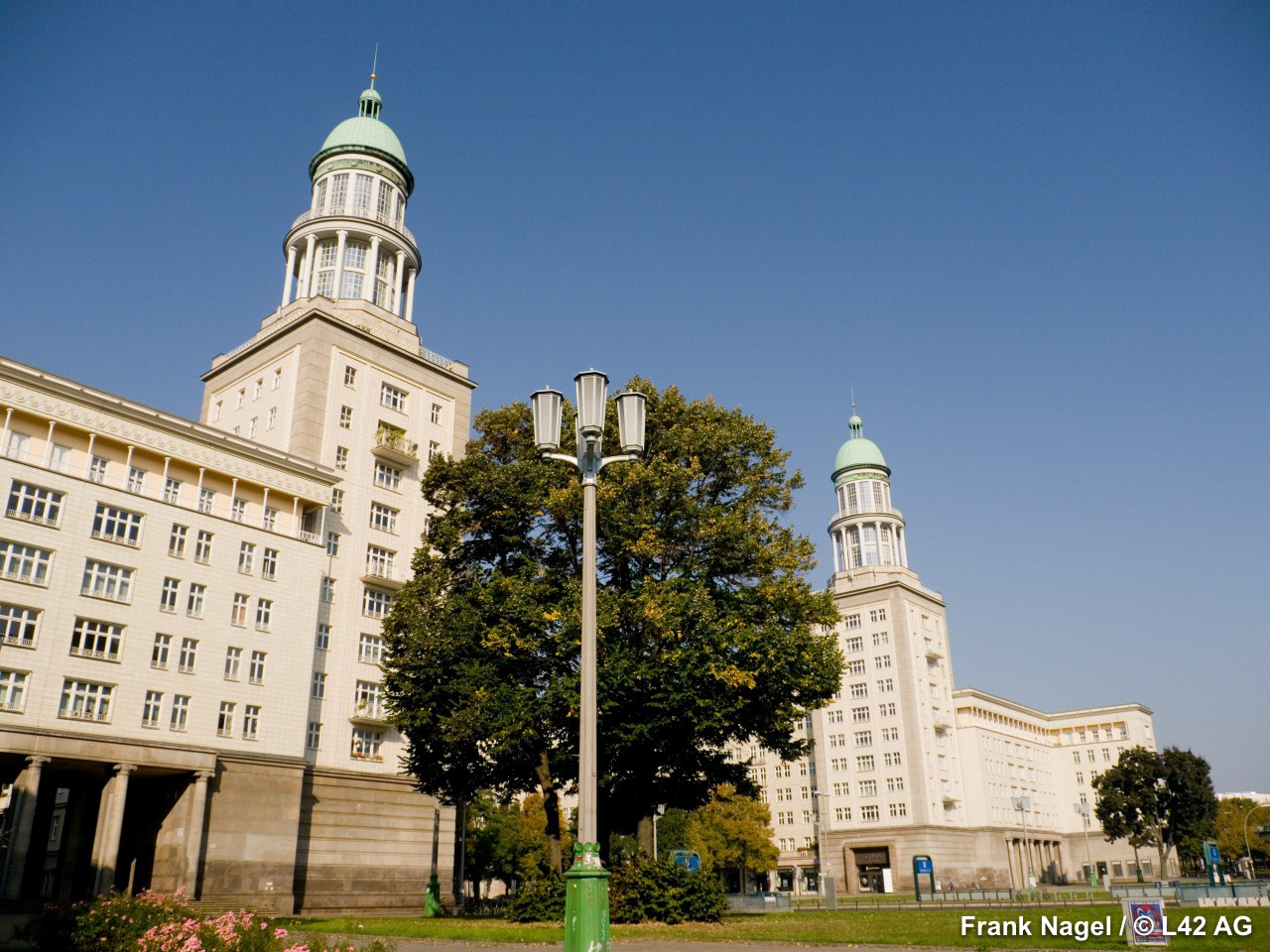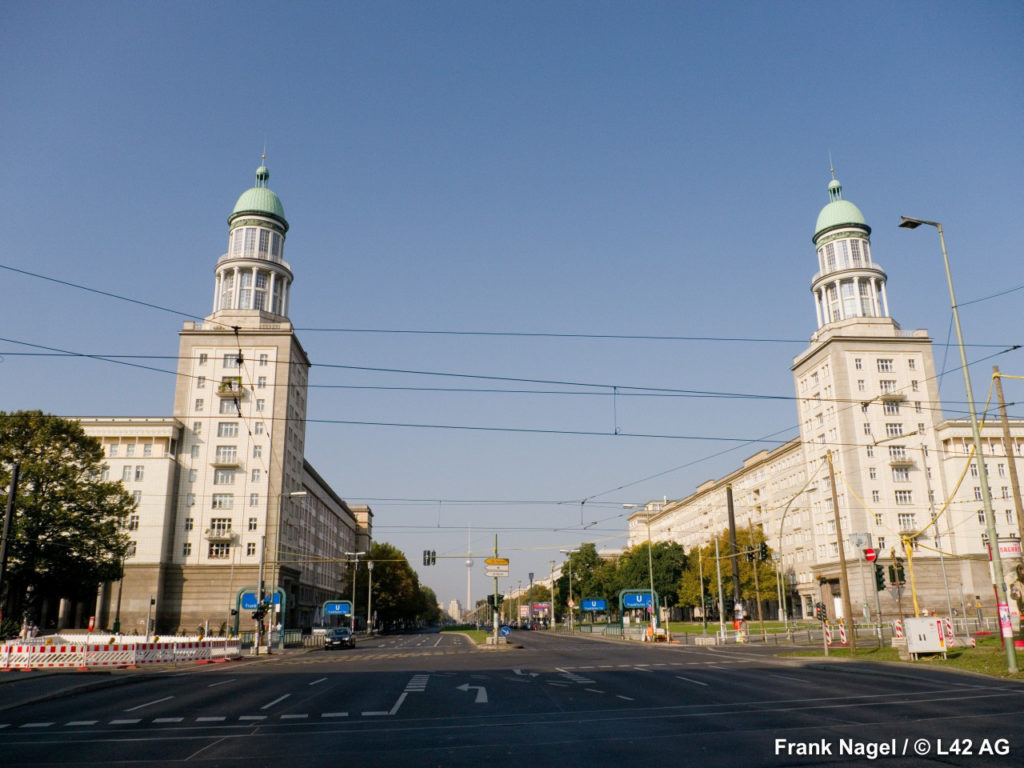
Frankfurter Tor, Berlin, January 27, 2013, 14:51
Recording nr. 8752
Ludmylle: [sings] …Es war ‘ne lange kalte Zeit, du wohntest nah und doch so weit du warst damals in der DDR und ich dachte eh, wie schön das wär’ wenn die Mauer fällt, ja das wollen wir sehen und uns endlich gegenüber stehen. Wir waren doch Freunde, irgendwie verwandt, haben uns nur noch nicht gekannt…
[tr. It was a long, cold time. You lived so close, and yet so far, you were there in the GDR and I thought, how nice it’d be, if the Wall came down, yeah, that’s what we want to see and then we’d stand in front of each other, you and me. We were friends, related somehow, just had never met…]
Sibylle: Udo Lindenberg, “Back in the DDR.”
Ludmylle: Udo Lindenberg, yeah. Everyone knows that one. The chorus even made it onto a famous documentary on the German Democratic Republic. And now they’ve asked us to tell the story of Karl-Marx-Allee. Tomorrow a television crew is coming to interview us in order to prepare a guide on our boulevard. What’s with all this morbid curiosity? What do they want to know? And why are we expected to talk? If it were up to me, I’d sent them all to Wittenbergplatz!
I can’t take any more of the usual comments, they all seem to have come directly from Euro Disney on a budget trip, you know, something like “Here-We-Go-Euro-Disney-East Berlin: A perceptual bungee jump for only 99 Euros!” They all just seem so lost, so worn out, incredulous even. “Good God what cosmic emptiness! Jesus what never-ending gray! What annihilating grandiosity! Where’s there a McDonald’s, a toilet, a bank machine, a slice of pizza, a Karstadt, a Desigual, a double-decker bus?”
What is it with them? What are they looking for here? Aquí no tenemos Desigual, aquí esta todo simétrico! Claro? La pizza si mangia a Napoli et vous allez à la toilette chez-vous!
The GDR, the German Democratic Republic doesn’t exist anymore! Go away! Shoo! Go back to Zoo Garten! There’s nothing to see here!
Sibylle: Well, one thing’s for certain, Ludmylle, if we talk like that tomorrow they’ll have good reason to think that here in the East we’re a bit gruff. If we don’t force ourselves to tell the stories we know, no doubt they’ll go to talk with the Fernsehturm (TV tower) or with the Palast der Republik (Palace of the Republic, seat of the former East German Parliament) instead…
Ludmylle: They’ve already demolished the Palast der Republik.
Sibylle: You see? It’s worth talking! Then everyone will understand that we deserve to be a world heritage site and UNESCO will come and bail us out. It’s a matter of life and death.
Ludmylle: In that case, comrade Ludmylle’s ready! We’ll begin with our very own KaDeWe!
Sibylle: Sorry?
Ludmylle: Humana First-Class Second-Hand is to KaDeWe as the Frankfurter Tor is to Wittenbergplatz. The kingdom of the previously consumed confronting the apotheosis of consumption! If it weren’t for the banana department, Humana and KaDeWe would be almost exactly the same! Granted, we don’t have the 6th floor “gastronomic specialties” section, true…and in the end we’ve only got four floors anyway.
Sibylle: What you’re calling the “banana department” is the most refined and best example of haute cuisine shopping in all of Europe, thank you. Over 10,000 square meters of products arriving fresh from all over the known world. Caviar, cheeses, wine, and other drinks of all kinds, exotic fruit…
Ludmylle: Like I said. Bananas.
Sibylle: French cuisine, Asian, Italian…
Ludmylle: Conceptually speaking, it’s all bananas. 10,000 square meters of decadent bananas. Come on, Sibylle, you can be honest with me! You know that from an anthropological point of view Humana is a lot more interesting than KaDeWe. We have a vintage section on the third floor…we even have wedding clothes for goodness’ sake!
Sibylle: Yeah, right, with some spots there and a tear here…but, in the end, who doesn’t have them, no?
Ludmylle: Well now! In addition to having a great warehouse of the people – which is extremely useful and anthropologically unparalleled – we also have the honor of introducing the entire world to the Karl-Marx-Allee! Here you go! The one and only grand boulevard constructed in Europe after the war! The Champs-Elysées of the new GDR proud to show itself off to its brother countries and those in the West as well! And it was with this spirit of pride that comrades Sibylle and Ludmylle were selected by the Party as the most beautiful domes of the GDR and gave them the honor of presenting it!
Sibylle: You’re being a bit facetious, Ludmylle, you know darn well that we never received any diploma of honor from the Party. We’ve been asked us by the West.
Ludmylle: Berlin’s been divided again? Then they should be more organized! Tagchen! [Slang for “hello”] We’re Sibylle and Ludmylle, the two domes of the Frankfurter Tor!
We are est est est, kapiert? We’re at the eastern end of the Karl-Marx-Allee, which itself is at the eastern end of the working class district of Friedrichshain in East Berlin. We are important, or rather, extremely important, eyewitnesses of that which once was known as the German Democratic Republic. You could say we are the GDR.
Sibylle: Let’s not exaggerate. And I might add that the GDR no longer exists…
Ludmylle: You got it.
Sibylle: Let me finish. The GDR no longer exists as a country, no, but naturally it remains in the memories of we who were there and we must remember to say that we are not simply two anonymous domes, but that our father, the architect Hermann Henselmann, had in mind the twin domes of the Gendarmenmarkt, the work of Carl Gontard, when he made us. And now, Ludmylle, if you please, you’ve always been a bit of an anarchist, let me do the talking tomorrow, I have a logical and chronological thread to follow, and I don’t want to create any problems with West Berlin.
Ludmylle: So, Berlin really has been redivided?
Sibylle: No, calm down a minute. See if you like this:
Dear visitor,
Imagine if you can the end of the war and a Berlin in complete physical and moral ruin. Imagine an immense space of destruction and the mental space required in order to move forward, for life to continue after a horrendous tragedy. Imagine a people that has been bombed and bewildered and that has been called from Moscow, where the new government is located, to redeem itself from the shame of National Socialism in order to be guided toward the values of solidarity and peace.
Ludmylle: Wow, it’s almost like “Imagine” by John Lennon, the Wessis will love it.
Sibylle: Dear visitor, imagine if you can that life here did not simply continue onward as it had been before, but, in reality, started over. From scratch.
Ludmylle: [sings]
(tr. From the ruins risen newly, / To the future turned, we stand. / Let us serve your good weal truly, / Germany, our fatherland.)
Sibylle: I’m talking about the process of history, which we’ll have to refer to tomorrow, Ludmylle, it’s serious.
Ludmylle: And I’m singing our hymn, and that’s extremely serious.
Sibylle: Imagine if you can that it was right here, on this street running from west to east all the way to Frankfurt on the Oder, or even further on to Moscow, that they decided to construct the new scenography of the rebirth of the political and social universe of eastern Germany. This road is the equivalent of a Roman decumanus. The Romans, as you’ll recall, constructed their cities and oriented them along two great axes: the cardo, which ran from north to south, and the decumanus, which intersected it from west to east.
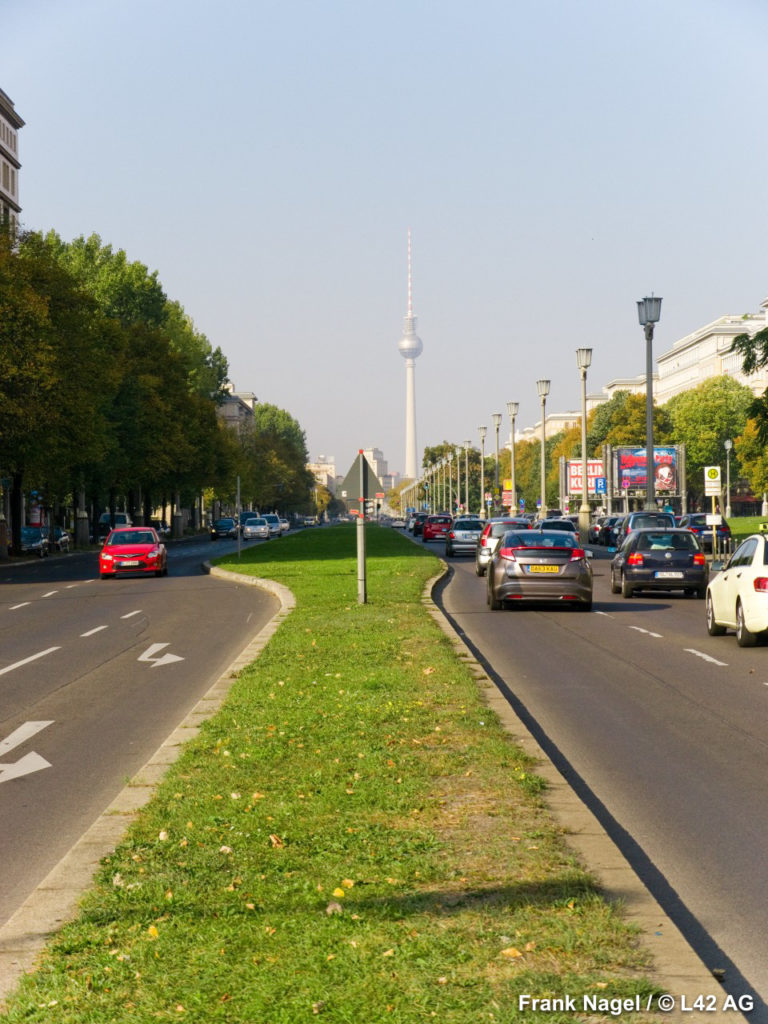
In our case, this great artery was called the Frankfurter Allee because it ran, that’s right, all the way to Frankfurt on the Oder. They took a stretch of this road – the 2.4 km running from Frankfurter Tor to Alexanderplatz – and decided to rename it after Stalin in honor of his 70th birthday, December 21, 1949. And so this stretch was now known as the Stalin Allee.
The GDR was born October 7, 1949, and had to immediately organize itself in order to be able to present its best sides to the world. It was therefore necessary to construct a backdrop of national unity, a unifying structure, to literally construct – starting with a clear architectural message – Socialism from the ground up. Back then, form had to be substance more than ever.
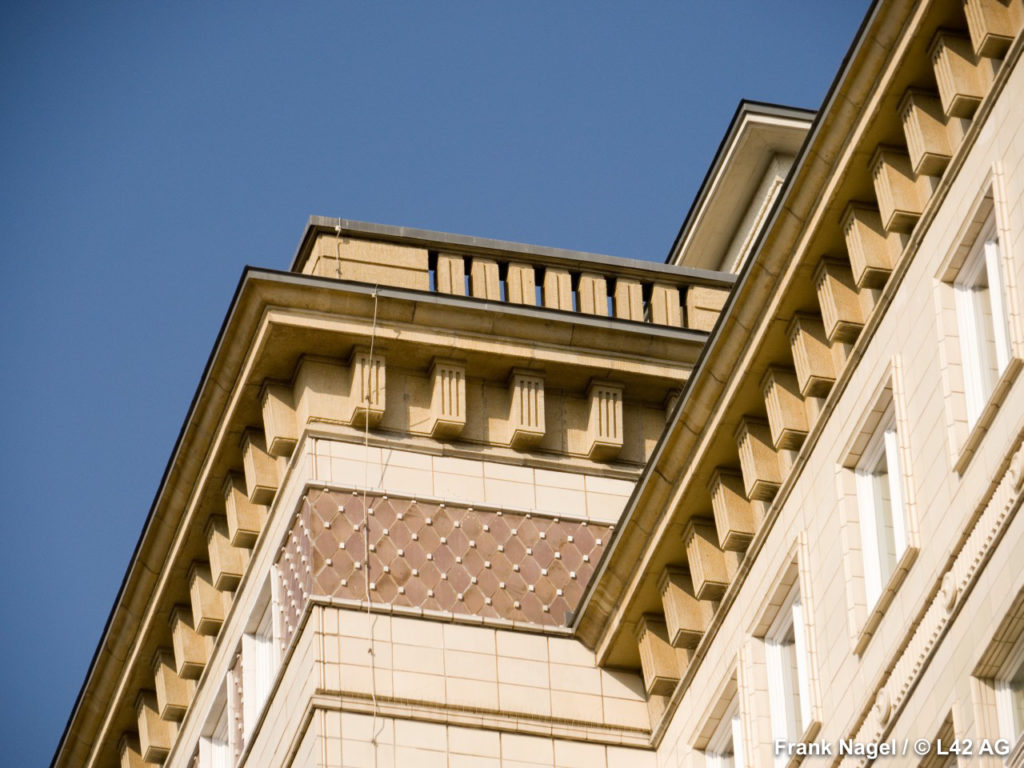
They enlarged the lanes of the street on the stretch from Frankfurter Tor to Strausberger Platz to 90 meters (295 feet). The parades had to be grandiose, filled to bursting with people, representatives of the people, and tanks. The May Day parades celebrating the worker were spectacular: carnations in every buttonhole and a sparkling sea of red banners…and October 7, the anniversary of the Republic, were truly a sight to be seen!
Architects Lydmylle Herzenstein and Hans Scharoun had already had the smallish buildings at numbers 102, 103, 104, 126, 127, and 128 constructed in a Laubenganghäuser style, that is, as balcony access houses, when the order arrived from Moscow to change styles. They were to completely break with modernist architecture as it was considered too nationalist, too bourgeois, and too individualist. In short, it was not socialist enough. These buildings, they said disparagingly, looked like American egg cartons! But the two of us here at Frankfurter Tor are something else!
The construction sites of the buildings being erected in the old style were to be covered up with plastic sheeting, trees were to be planted to cover up those which had already been finished, and an open competition for the realization of the new, grandiose, socialist image was announced.
Ludmylle: And so Christo and Jeanne-Claude’s wrapping of the Reichstag between June 27 and July 7, 1995, wasn’t really anything all that original, the idea came from our glorious republic, like a lot of other things.
Sibylle: Don’t make me lose my train of thought! We’re talking about our history. The large building our father completed in 1952 at Weberwiese, the so-called “white swan” because of its height and its elegant covering of cream-colored majolica, was considered beautiful. It might be a little reminiscent of Schinkel’s classicism, but our towers, Moscow made it known, had to move forward and quickly! This imposing neo-classicist stucco and majolica-decorated style became known as “Stalinist-Baroque” or “gingerbread style” (Zuckerbäckerstil).
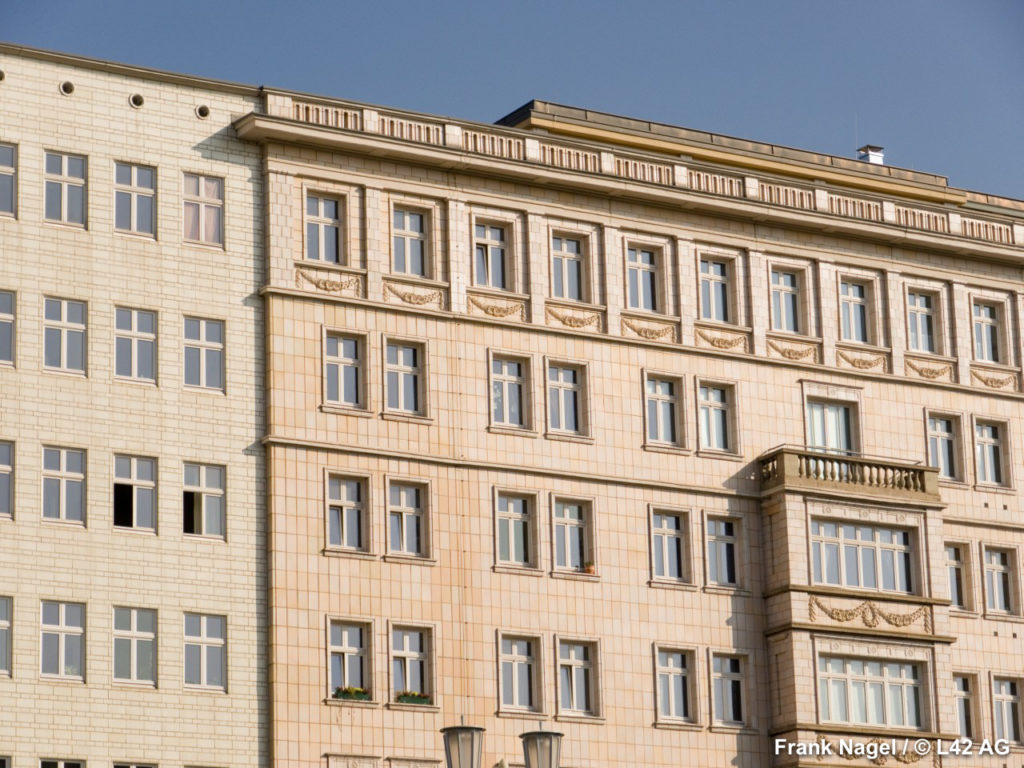
Six collectives of architects were awarded the construction contracts for living quarters: three thousand beautiful and comfortable houses “for the people” were to be constructed in record time. The names of the architects responsible for the winning projects were as follows. First place went to Hegon Hartman, who constructed block B; second place to Richard Paulick for block C, which later became universally admired for its harmony and symmetry. Block C can be found between the Straße der Pariser Kommune and Koppenstraße and includes the famous Karl Marx Buchhandlung – at that time an extremely important bookshop and fervent cultural center whose sign still exists today – and the highly celebrated, feverishly active, and precious Café Sibylle at number 72, the ex-Milchtrinkhalle. Richard Paulick was also the one behind construction of the Deutsche Sporthalle, the monumental and modern gymnasium that hosted the III World Youth Games in 1951. And it only took 148 days to build!
Ludmylle: A real record! Ah, what one didn’t do for sports! The GDR loved sports!
Sibylle: Third place to Hanns Hopp.
Ludmylle: What a fantastically athletic name! Third place in what?
Sibylle: In the open architectural competition. And its thanks to him that we have blocks G and E right here. We were talking about the open competition of architects in charge of building the monumental apartment blocks.
Ludmylle: Sorry, but I think we were actually talking about sports.
Sibylle: Well, about the Sporthalle, thank you very much. About the gymnasium Ludmylle, because it was designed by Richard Paulick. That one which used to be found between Blocks B and C and could hold up to 4,000 visitors, remember?
Ludmylle: Of course I remember!
Sibylle: In fourth place Karl Souradny, creator of Block F, right here next to the Frankfurter Tor.
Ludmylle: Wait, weren’t you talking about the Sporthalle?
Sibylle: I’m done with that already! The Sporthalle was constructed in 1951.
Do you think I need to mention the statue of Stalin that was right here in front of us on the other side of the street?
Ludmylle: Notoriously athletic. He was there to control the regular development of the competitions…No, you just have to say they’re no longer there, either of them, otherwise they’ll all go and try to find them. I can already hear them, “Excuse me, Sie bitte, where ist the Sporthalle?”
Sibylle: Well, last, but not least, Kurt W. Leucht, who was in charge of planning Block D.
Ludmylle: You’re compulsive, Sibylle, you and your apartment blocks…Let’s talk about the Deutsche Sporthalle!
Sibylle: Me! Compulsive? You tell me what there still is to say about your beloved Sporthalle! I know what you’re getting at! You begin a totally normal conversation and then start breaking up the flow, you jump from one topic to the other with your backwoods syllogisms! I put up with you, and that’s fine, but we don’t have a lot of time right now and I’m simply out of patience! Tomorrow we have to be able to give a logical and coherent account of our republic! Co-her-ent! Get it? So go on, come on out with your story about anabolic steroids, that way we can get it done and over with! No imagination at all! You’re just unoriginal and annoying!
Ludmylle: And you’re just uptight, Sibylle, because you’re trying to establish coherence where there isn’t any. Even if you establish an order for all your monumental apartment blocks there’re always surprises just waiting to be found! And, in any event, I wasn’t interested in talking about pills. Turinabol came about in the 1970s and ‘80s, as you know. The Sporthalle was torn down in 1971 because it was unstable. That’s all I wanted to add. Maybe I would’ve added that the statue of Stalin couldn’t have been disappointed because it in its turn had already been removed ten years before that. I don’t see why you’re so upset all because of a sports hall! Go on, let’s hear more about those blocks.
Sibylle: I’m finished.
Ludmylle: You forgot about Block A.
Sibylle: Ah, you’re right. Well, our father, Hermann Henselmann, was involved with that but outside of the competition, honoris causa. He was entrusted with the construction of Strausberger Platz, the so-called Block A, and the Frankfurter Tor. In short, the alpha and the omega of the monumental stretch of Stalin Allee.
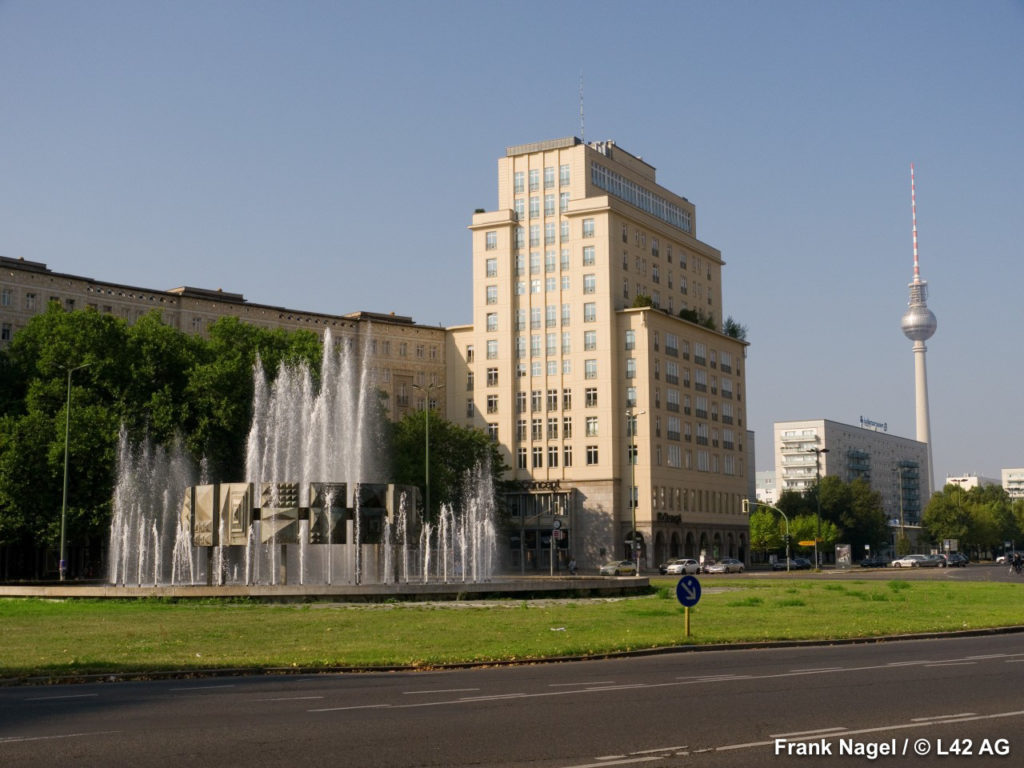
There at Strausberger Platz was the famous Haus des Kindes, which was frequented by multiple generations more or less regularly up until it ceased to be in 1990. There you could find everything, or almost everything, kids might have needed. Clothes, games, anything you needed for school, there was a puppet theatre, a café for kids up on the 13th floor where the parents could enjoy the spectacular view over our Berlin, but only if they were accompanied by children!
The construction of the buildings themselves was entrusted to the people, many of whom were women, as they hadn’t died in the war, had not been taken prisoner, and had not been handicapped. 10,000 volunteers responded to the call. Work was divided into about thirty principal subdivisions.
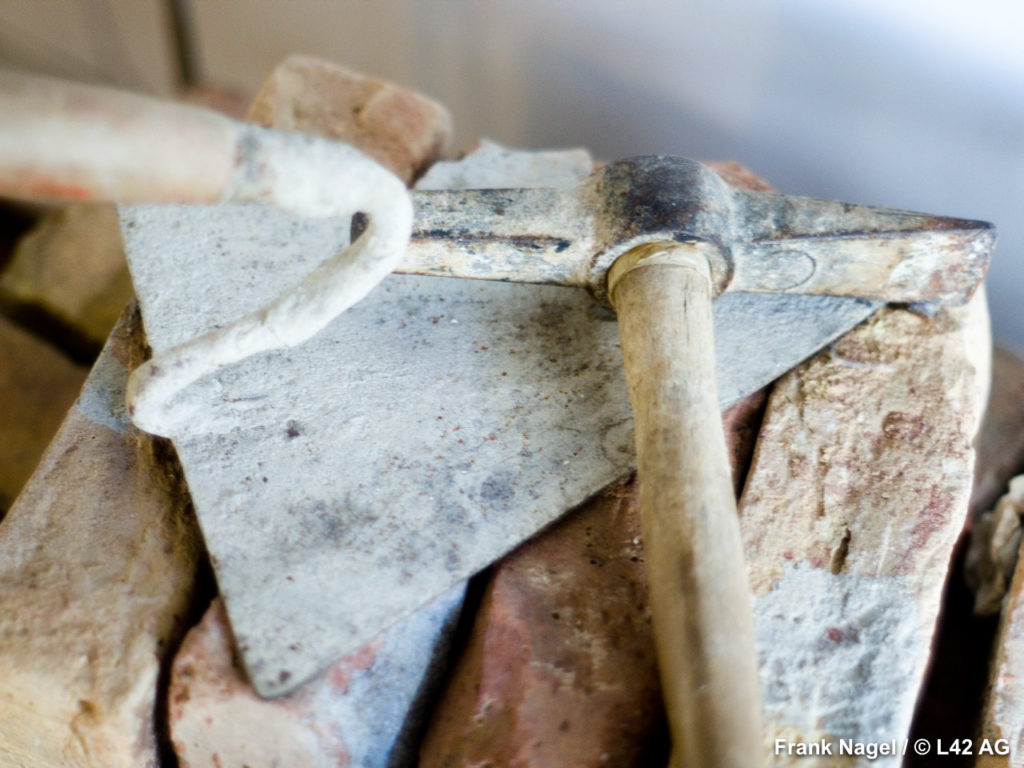
Among the masons, for example, there were those who mixed the cement, those who put together the scaffolding, the foundation specialists, those responsible for the transport of materials, who then were themselves divided into categories, and then there was the group in charge of laying the asphalt…and then once the structures were finished came the painters, the plumbers, the tilers, the electricians…All in all a huge number of workers.
Actively participating gave them the hopes of winning an apartment through the lottery. Yes, that’s how it worked. There was a lottery. Or thanks to their work. Every family received a notebook entitled The Family Honor Book that had the subtitle “Because We Love our Motherland Germany, We Are Helping our Capital of Berlin”. Within it were recorded stamps documenting their presence at the work sites. For every three hundred hours of work you received a lottery ticket. There were many, many winning tickets.
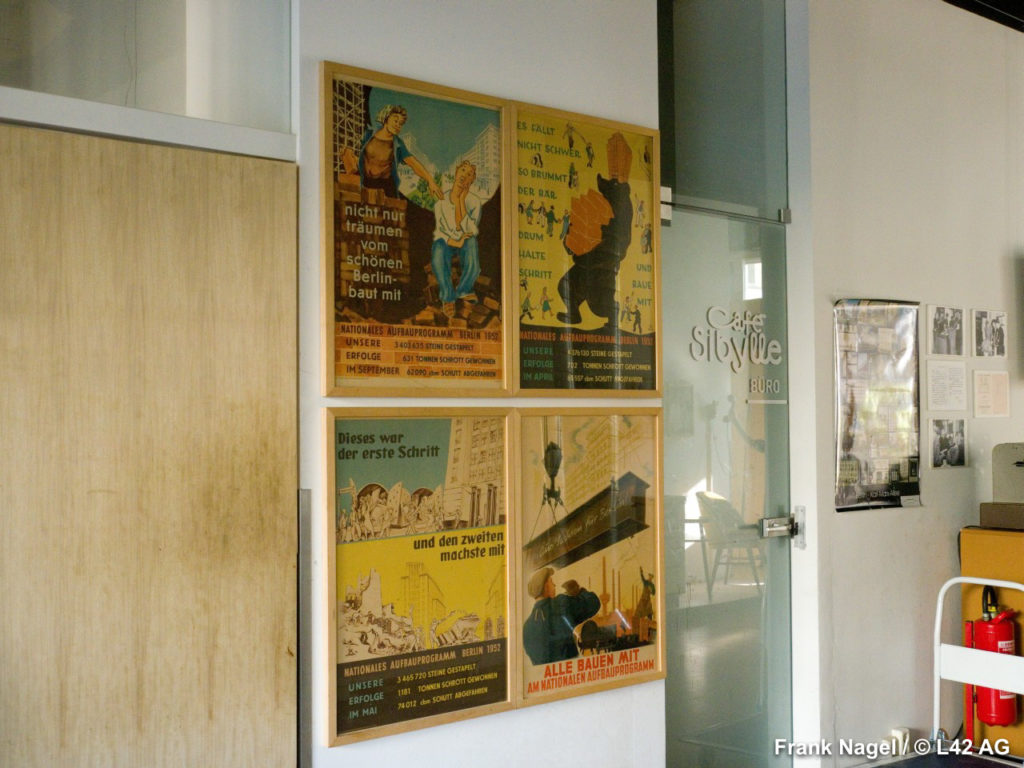
There was a great publicity campaign to incite the workers with slogans like “Do not just dream a beautiful Berlin! Build it!”, “These are the first results! Be a part of the second!”, “You can do it! The bear’s word!” and with it came a picture of a bear, the symbol of Berlin, carrying bricks. And then “So come on now!”. The apartments were to have every convenience: a bathroom, a cooking range, centralized heat, some even a telephone and…
Ludmylle: …and, miracle of miracles, an el-e-va-tor! Impossible to describe what a trip that was at the time!
Sibylle: Indeed! And with all the cold centralized heating was a real luxury. And a bathroom in the apartment was totally modern. Enough with sharing a bathroom out on the landing!
The founding myths of Berliner socialism in 1952, everyone had their own and everyone worked hard to realize them.
Ludmylle: [sings]
Lasst uns pflügen, laßt uns bauen,
Lernt und schafft wie nie zuvor,
Und der eignen Kraft vertrauend,
Steigt ein frei Geschlecht empor
(tr. Let us plough and build our nation, / Learn and work as never yet, / That a free new generation, / Faith in its own strength beget!)
Sibylle: I’m trying to tell the story of our history and you just keep on interrupting.
Ludmylle: I’m not interrupting at all, I’m accompanying your story with our hymn.
Sibylle: Right, Ludmylle, let’s try this: If I need a soundtrack tomorrow I’ll let you know, okay?
Ludmylle: But you forgot about the founding myth of the vacuum cleaner!
Sibylle: Should I talk about how much dust there was at the construction sites?
Ludmylle: Are you kidding? All of those poor women rummaging through the rubble looking for mattresses to take and clean up before trying to resell them…and by vacuum cleaner I mean vacuum cleaner, that electrical appliance that’s everywhere today but which back then seemed like something straight out of science fiction! One was provided to every household. Every comfort, that was the phrase of the day, for the workers who were working toward modernity. In exchange, Old Pointed Beard simply demanded loyalty to the party.
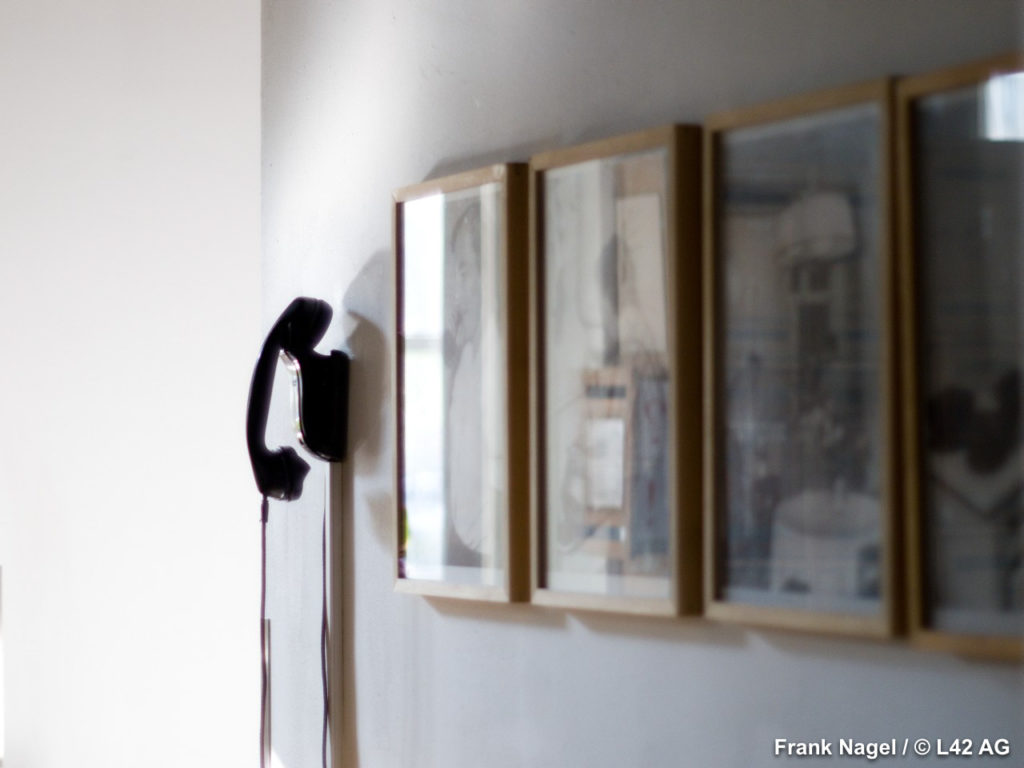
Sibylle: If you say “Old Pointed Beard” tomorrow, Ludmylle, no one will have any idea what you are talking about. Let me handle it.
Ludmylle: Walter Ulbricht, General Secretary of the SED, the Socialist Unity Party of Germany, and later even our president. Who isn’t familiar with “Old Pointed Beard”? He’s even there at Madame Tussauds! The “Disney-tourists” can even have their photo taken with him!
Sibylle: With a celebration at the Staatsoper on December 21, 1952, keys were given to 667 construction workers, 322 clerks, and 149 party functionaries, many of whom had distinguished themselves by being among the best workers. The first 70 tenants solemnly took possession of their new apartments with an enthusiastic inauguration ceremony on January 7, 1953.
It seemed liked it would mark the beginning of a great year but without warning on March 5 “the heart of the greatest man of our times, comrade Joseph Vissarionovich Stalin” ceased to beat. That was the title of the daily newspaper Neues Deutschland. It was a great blow to everyone. We really did feel like we were once again orphans without a father. On March 9 a long, solemn funeral march took place here along the avenue and people left great masses of flowers at the feet of Stalin’s statue.
The SED, in reality, did not abandon us at all. It had already met at the second party conference in 1952 in order to make important decisions about the Construction of Socialism.

This consisted in a great strengthening of heavy industry at the cost of the production of consumer goods, which declined in quality and increased in cost. A bar of chocolate that cost fifty cents in the West cost eight marks here in the East. The Marshall Plan, naturally, never made it over here to us. Furthermore, at the beginning of June a proposition was introduced that was to take effect by the end of the month to increase work norms by 10% and yet decrease salaries.
Displeasure and dissatisfaction spread and grew throughout the construction sites along the Stalin Allee. The laborers stopped working well. A protest letter was written, but it remained unheard. And so, on June 16, 1953, the Stalin Allee workers began a strike which culminated the following day, June 17, with over 40,000 participants. They marched up our grand avenue here, from Strausberger Platz all the way up to the House of the Ministries located at the corner of Leipziger- and Wilhelmstraße – that very building which only a few years before had been the German Ministry of Aviation and which today is the Federal Ministry of Finance.
Ludmylle: That’s a pretty long way! Almost all the way to Potsdamer Platz!
Sibylle: You got it – little by little the crowd grew larger. There were workers from the hospital in Friedrichshain, metalworkers, electricians and countless others.
Ludmylle:[sings]
Und wir zwingen sie vereint
(tr. Triumph over bygone sorrow, / Can in unity be won…)
Sibylle: 100,000 people marching in the pouring rain.
Ludmylle: It was practically a river!
Sibylle: They had started out asking for better work conditions and finished by demanding free elections and the reunification of the nation. The protests spread to other cities throughout East Germany and even found support in West Berlin. The RIAS radio station (Rundfunk im amerikanischen Sektor – Broadcasting in the American Sector) transmitted the developments of the uprising from their headquarters in Schöneberg and in so doing helped both bring and increase support.
Ludmylle: [sings]
Wenn wir brüderlich uns einen,
Schlagen wir des Volkes Feind!
(tr. In fraternity united, / We shall crush the people’s foe.)
Sibylle: At first the regime remained perplexed, but then it called in Soviet tanks to help put down the revolt, which by that point had already quieted down quite a bit on its own.
Ludmylle: Always a bad idea.
Sibylle: Indeed. The 600 tanks and 20,000 Soviet soldiers who came to assist the 15,000 German police just managed to anger the crowd even more.
Ludmylle: [sings]
Glück und Frieden sei beschieden
Deutschland, unserm Vaterland.
Alle Welt sehnt sich nach Frieden,
Reicht den Völkern eure Hand.
(tr. May both peace and joy inspire, / Germany, our fatherland. / Peace is all the world’s desire, / To the peoples lend your hand.)
Sibylle: The protest became even more political. The announcement that the infamous norms would be withdrawn solved nothing. The demonstrators had lost all faith in the government whatsoever. 55 demonstrators lost their lives through direct conflicts, and there were a number of other indirect victims. Today we still do not have an official number of the dead. Close to 7,500 people were arrested and of those 1,200 were convicted. Four were even executed.
Ludmylle: [sings]
Lasst das Licht des Friedens scheinen,
Daß nie eine Mutter mehr
Ihren Sohn beweint.
Ihren Sohn beweint
(tr. Let all paths by peace be lighted, / That no mother shall again / Mourn her son in woe, / Mourn her son in woe…)
Sibylle: Today June 17 is remembered as the anniversary of the first uprising within the GDR and as the first step toward the reunification of the two Germanies. That’s why the long avenue which cuts through the Tiergarten is called the Street of June 17th. Stalin’s death, the June 17th revolt, and Nikita Kruschev’s new path signaled the end of the great, if brief, architectural dream. The magnificence definitively ended at Strausberger Platz. The stretch of Stalin Allee from Strausberger Platz to Alexanderplatz was completed quickly, and without any pretenses whatsoever, with those typical postwar public housing buildings the so-called Plattenbauten.
Ludmylle: A dream interruptus.
S That’s right. Today this stretch of Karl-Marx-Allee from Strausberger Platz to Alexanderplatz is 180 meters wide (590 feet), double the size of that large first bit between Frankfurter Tor and Strausberger Platz. It gives one the impression of being a parade ground that’s attached to the already immense Alexanderplatz. Exaggerated proportions. There’s the Cinema International, the immense Hotel Berolina and one can glimpse here, just behind it, the municipal building of Mitte, the city’s central district.
Ludmylle: And then there’re also some poor roving spirits. When the wind blows in from Siberia it’s really cold here! The poor little things can’t even find refuge at Café Moskau because these days it’s only open for special events and the Siberian wind isn’t one of them. The 1960s – now that was a time for Café Moskau!
S Between 1961 and 1962 here close by they also built the Kosmos Cinema, the biggest and most modern cinema in the GDR, remember?
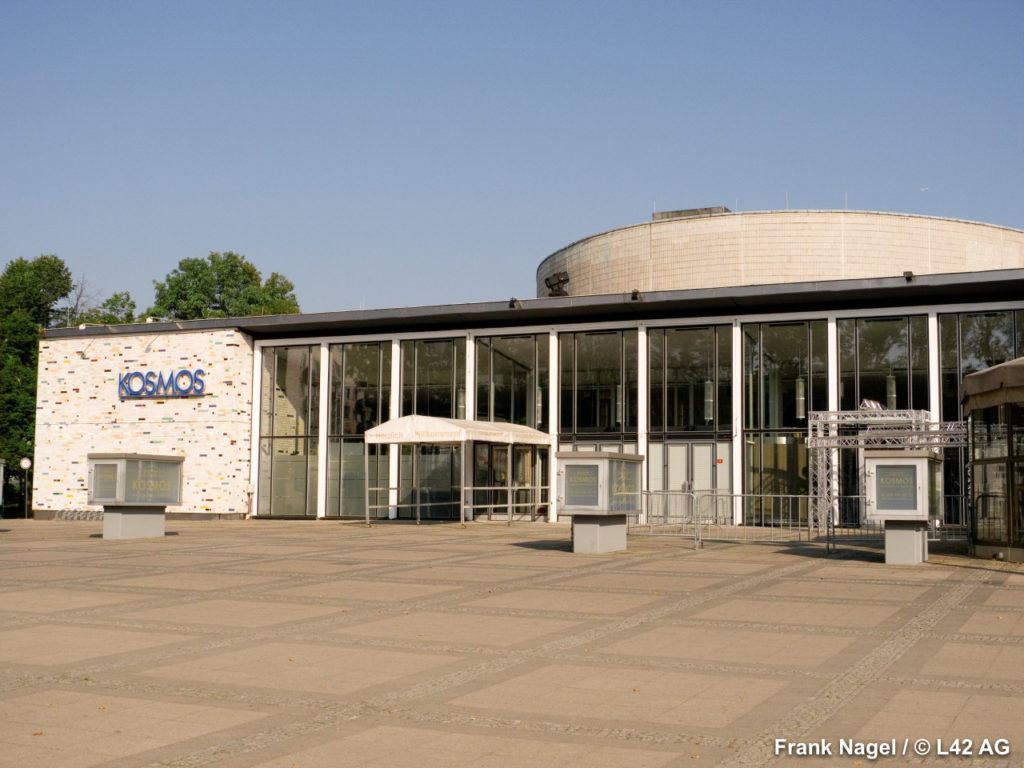
Ludmylle: Of course I remember! 1,001 person capacity! It still exists, at Number 133 though it’s no longer a cinema, but a theatre used for conferences.
S And you remember the night between November 13 and 14, 1961? Stalin had already been dead eight years, and we were in the full swing of de-Stalinization as it was called. In the Soviet Union they had finally come to realize that his regime of gulag and terror had managed to kill millions of Russians. Whoever had gone to sleep that night on Stalin Allee woke up the next morning on Karl-Marx-Allee.
Ludmylle: How could I forget! Helter-skelter! That was the night they even took away the 4.60 meter high (15 feet), 2.5 ton bronze statue that stood in front of that gym that annoys you so much, right there between Andreasstraße and Koppenstraße, and they used it for the sculptures over in the Tierpark (zoo).
Sibylle: Nothing is created, nothing is destroyed, everything just changes form and it’s not the Sporthalle that gets on my nerves, but your way of talking!
Ludmylle: An intrepid construction worker, Gerhard Wolf, managed to save an ear and a piece of his mustache, however, and you can still find them today over at the Café Sibylle Museum. What might be of interest to the Disney tourists is the fact that for only 10 Euros you can buy a copy of the statue version of Stalin’s ear as a souvenir. A little something from Berlin for the office head.
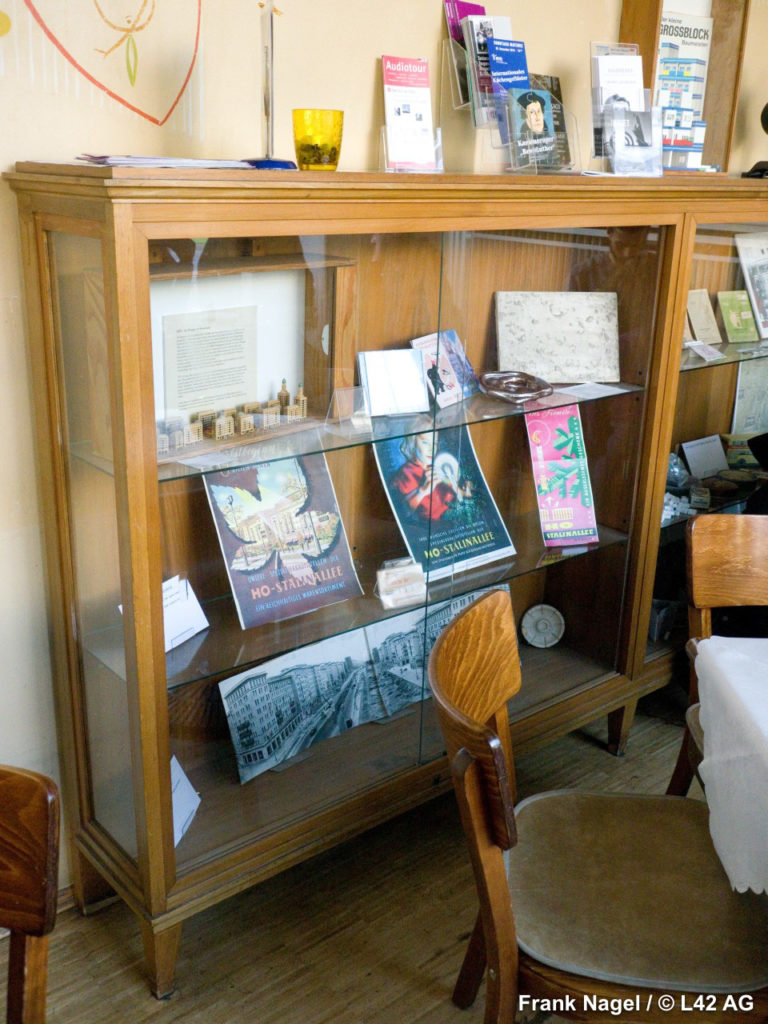
Sibylle: Well, one thing’s for sure, if you continue to refer to them as “Disney tourists” tomorrow you’ll make a fool of yourself. The visitors will be offended and won’t come to find us anymore!
Ludmylle: And who really gives a sh…erm, I mean, look, the “Disney tourists” are actually kind of cute. I call them that with love…have you ever noticed how they rent a bunch of our Trabis (the “Trabant” was an automobile produced in East Germany between 1957 and 1990) and just go around tooting their horns? They really just enjoy themselves like that, and I think it’s cute. That they really think those boxes of plastic contain some piece of history, they enjoy our two-stroke engines like children do a carousel. What are you going to do? You can’t just smack them around, you just have to take them as they are!
Sibylle: You know what we missed out on, Ludmylle?
Ludmylle: Well, first of all, a serious economy, and then an honest political class, true freedom…
Sibylle: …a certain light-heartedness. It wasn’t allowed to us. By the time we were born we were already full of objectives, programs, responsibilities, collective discussions. We were constantly loaded with responsibilities and frustrations from the very beginning. You remember collective potty training? Already in pre-school you had to wait until everyone else was finished before you could get up. The destruction of any impulse toward being an individual, always being considered simply a tiny element in a much greater mechanism. You could never say “I”, you always had to express yourself in the first person plural or, at the most, the third person singular meaning the Party, the State, our President.
Ludmylle: True. And all of that weighs you down, it’s overwhelming.
Sibylle: It is. Our avenue was always only a mirror of our history. Little by little the economy began to stagnate in the 1970s, then it got terribly worse in the 1980s, up to the point where they were forced to remove all those beautiful majolica tiles from our buildings. Little by little the importation of consumer goods dwindled to the point that even the shop windows began to be depressed. And even if industry was dying out, suffocated by its own toxic fumes and the absence of investment, a certain amount of soot still managed to arrive over here from the smokestacks. Even the Politbüro [the most important political organ of the SED in the GDR] was transferred to Wandlitz, out there in the country…but there wasn’t a thing missing in that nice residence, that’s for sure.
Over time Karl-Marx-Allee became nothing more than a backdrop to greater, and ever more meaningless parades. People even began to start referring to the avenue as “Stalin’s toilet” on account of the tiles.
And the more consensus between the rulers and the ruled came undone, the more excessive the great collective rallies upon our avenue became. Our extraordinary Duosan, the GDR’s famous fix-it-all superglue, was desperately employed in reattaching majolica as well as politics, but the criticisms and the fissures continued to multiply. They even called us Duoson Allee. How awful! And the young remained the last desperate reservoir of consensus and disillusionment, they who had once been the hope of the regime.
Ludmylle: [sings]
Deutsche Jugend, bestes Streben
Unsres Volks in dir vereint,
[tr. German youth, for whom the striving / Of our people is at one]
Sibylle: Eh, no, Ludmylle. Since 1972 no one has sung our hymn. Forbidden. Contrary to when Willy Brandt said “But how can you not desire the reunification of Germany? You even sing it in the first line of your national hymn – ‘Deutschland einig Vaterland!’?” And from then on no more! Choirs silenced! Only as an instrumental! Up until our republic itself was no more.
Ludmylle: [sings]
M-m M-m, m-m M-m
M-m M m m m-m
Sibylle: Exactly, just like that.
Ludmylle: Well, to make up for it the FDJ (Free German Youth – socialist youth movement of the GDR) sang like crazy! Blue shirts, red neckerchiefs, and lots of enthusiasm!
Sibylle: [sings]
Lobt das Lernen, mehrt das Wissen,
preist des Volkes Schöpferkraft!
Unsre Zeit greift nach den Sternen!
Ehr´ und Ruhm der Wissenschaft.
Ludmylle & Sibylle: [singing]
Vorwärts, Freie Deutsche Jugend!
Der Partei unser Vertrauen!
An der Seite der Genossen
woll’n wir heut’ das Morgen bauen!
Ludmylle: [sings]
Lernt im Geiste Thälmanns kämpfen
für die junge Republik!
Unsre Zeit braucht Herz und Hände,
und der Frieden braucht den Sieg.
Ludmylle & Sibylle: [singing]
Vorwärts, Freie Deutsche Jugend!
Der Partei unser Vertrauen!
An der Seite der Genossen
woll’n wir heut’ das Morgen bauen!
woll’n wir heut’ das Morgen bauen!
Sibylle: [sings]
Seid bereit und kampfentschlossen,
wenn Gefahren uns bedrohn!
Unsre Zeit will Glück und Frieden,
Freundschaft zur Sowjetunion!
Ludmylle & Sibylle: [singing]
Vorwärts, Freie Deutsche Jugend!
Der Partei unser Vertrauen!
An der Seite der Genossen
woll’n wir heut’ das Leben bauen!
woll’n wir heut’ das Leben bauen!
[Hymn of the FDJ, words by Karl-Heinz Thiele]
Sibylle: It was abnormal, appalling, unreal, that’s obvious, but it was also magnificent!
Ludmylle: Because we were young. History is always made up of multiple histories. Even though we sometimes live through atrocious governments and times, beautiful memories live on in our hearts.
Sibylle: Hold on, hold on! How did it go again? [sings]
Bau auf! Bau auf! Bau auf! Bau auf!
Ludmylle: [sings]
Freie Deutsche Jugend, bau auf!
Sibylle: & Ludmylle: [singing]
Für eine bess’re Zukunft richten wir die Heimat auf!
Deutsche Jugend, steh deinen Mann
[tr. Let’s build! Free German Youth, let’s build! For a brighter future we shall build our homeland! German youth, stay strong!]
Ludmylle: What were we supposed to build exactly? Everything was falling apart!
Sibylle: But we celebrated on this avenue up until the very end, didn’t we! In 1986 we celebrated the 40th anniversary of the FDJ! And in 1987 President Honecker said: “In spite of everything, the ship is solid and shall arrive at its goal!”
Ludmylle: Of course, how could I not remember! And then there was the 40th anniversary of the GDR! In 1989! And then the president stepped down.
Sibylle: Naturally, while we were busy singing “Vorwärts Freie Deutsche Jugend,” young people on the other side of Berlin and the rest of the normal world were listening to, singing, and playing the music of regular young people.
Ludmylle:From a certain point of view, we sure missed a whole lot.
Sibylle: In a different sense, however, having had practically everything that was attractive in some way banned, we had to suffer for every little victory, and that taught you a lot. Looking back, all that was also a form of pure poetry.
Ludmylle: If you want to put a Savigny Platz punk next to a punk from Frankfurter Tor, modesty aside, that, my friend, is truly pure poetry!
Sibylle: And this collective suffering, collective dreaming, this search for the courage to trust ourselves there where having the wrong friendship could really get you into serious trouble, didn’t all of that maybe unite us in an extremely profound and indescribable way?
Ludmylle: And that pure joy when a thin ray of sunshine would filter in through the impenetrable dark of the wood? And when you reached for that bit of light? And when lack suddenly became a wholeness?
Sibylle: Well, as you know, privation didn’t get the better of all of us, some of us managed to stay balanced and healthy. Those among us who did manage, we made it through strengthened forever.
Ludmylle: A Darwinism of the soul…
Sibylle: An increase in consciousness, in spite of ourselves. A kind of socialistic Buddhism, if you will.
Ludmylle: It’s our secret, and shall remain inexpressible.
Sibylle: And so we shall take care of it. It’s as precious and incomprehensible as love. Indescribable. It’s our vital instinct.
Ludmylle: We had good schools, we were used to making an effort, to working after school, to managing on our own from when we were young because our mothers were at work. We certainly had a sense of the group and of sacrifice. All too well perhaps. But if we think about the young today, my oh my, Pippi Longstockings with learning difficulties. No rules, no grades, gummy bears “et circenses…”
Sibylle: Well, now that we’re united, I mean East and West, if we want to avoid a civil war in education we need a third way as a model, we need to take one of strong points and apply it to the system of Berlin.
Ludmylle: Sorry, but just what the heck are you talking about?
Sibylle: I’m practicing political rhetoric. Tomorrow they’ll without any doubt ask us about the young. They always do that when they don’t know what else to say. And that’s why we’re already preparing the responses, just like “Old Pointed Beard” did! Let’s take, for example, Hamb…
Ludmylle: How provincial!
Sibylle: You didn’t even let me finish! Take, for example, Fran…
Ludmylle: Even more provincial!
Sibylle: Okay, okay! The Bavarian model, then!
Ludmylle: Oh my goodness the Bavarians are so annoying! There they are with their hands raised all the time!
Sibylle: What, you mean they’re Nazis?
Ludmylle: No, I mean they’re always the best in the class! They’re less socialist than the Swiss. Why don’t they just form a fine Helvatian-Bavarian Confederation and let the rest of us get on with it?
Sibylle: Ludmylle, have you gone nuts? We are EIN Volk! One people!
Ludmylle: Yes, but they’re the ones who’re always raising their hands! They never work together! Haven’t they ever had to do group work with others at school? They’re just geared toward competition for its own sake…
Sibylle: Ludmylle? Pssst…Mmmmm….Psssst… [incomprehensible]
Ludmylle: Apoplectic aphonia? You’re gesticulating like a Neapolitan, what’s wrong with you?
Sibylle: Mmmmm….Pssst… [incomprehensible]
Ludmylle: I’m not supposed to talk? Ah! You’re afraid there’s a bug somewhere? You see what happens after forty years of dictatorship? A paranoid people! After the fall of the Wall we were cleared, remember? The Wessis came and cleared us of bugs! And anyway, who would want to listen to us?
Sibylle: Wschmschn… [incomprehensible]
Ludmylle: The washing machine? The washing machine is listening to us? What the hell are you talking about?
Sibylle: Mmmmm….Fluss….psst… [incomprehensible]
Ludmylle: The washing machine on the river?
Sibylle: Jmss…Bondssst… [incomprehensible]
Ludmylle: James Bond in the washing machine on the river! Ah you mean the Kanzleramt! The secret services are listening in on us?
Sibylle: Psstt…
Ludmylle: You’ve seen too many films on the GDR, Sibylle! “Hello dear listeners of the secret services! If you who are listening to us want to punish us, come tomorrow together with the journalists dressed in Lederhosen, woolen socks, hiking boots, checked shirts, suspenders, and Alpine hats. At that point, seeing you from afar, we’ll understand that you want to deport us for five years and place us in the Bavarian school system and we’ll implode, instantaneously, but with dignity. If instead you’d like to save us as a UNESCO world heritage site, please just hold up a bottle of Unicum, the Hungarian bitters (you can easily find a bottle at the Hungarian wine shop at Number 112). Then we can celebrate together!”
Sibylle: Dear oh dear, why couldn’t my father only have conceived me instead of this one here, too?
Ludmylle: Well, because, apart from Unicum, which is, well, unique, dialogue is always essential! It is the essence of democracy, dear! You should know!
Sibylle: Should I call over to the Café Sibylle and order us two beers and two bowls of lentil soup? Well, and the miniature models of the apartment blocks we need for tomorrow.
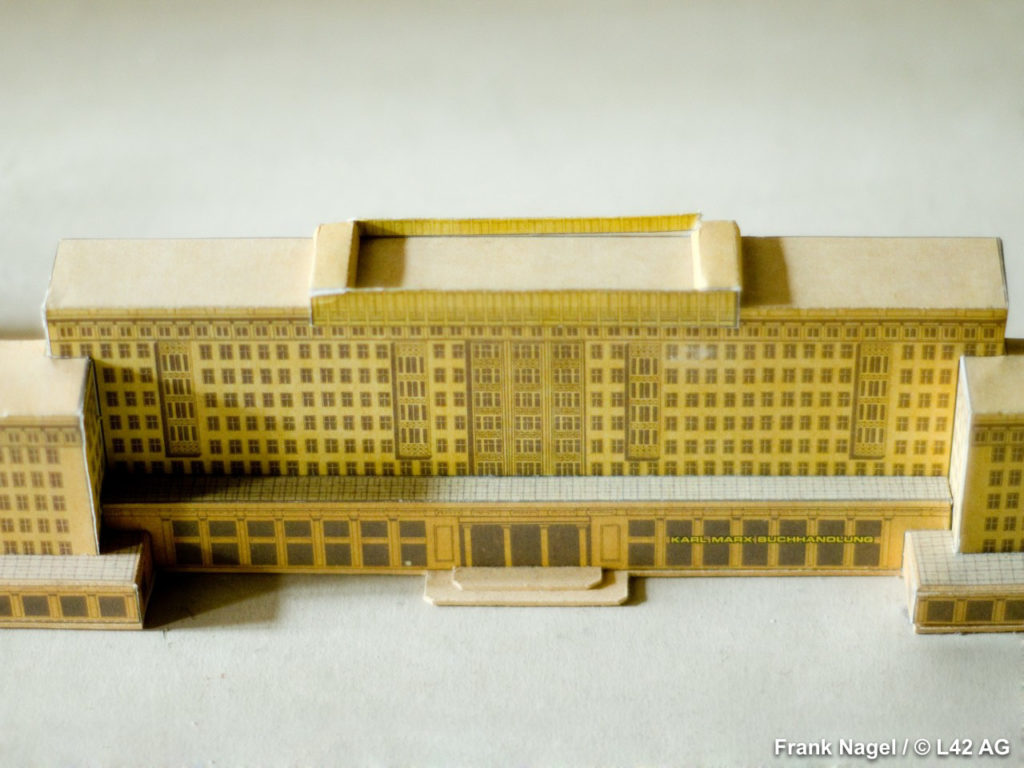
Ludmylle: I’m with you on the soup and the beer but the miniature models of the apartment blocks?
Sibylle: Yes: A, B, C, D, E, F, and G – that way we can remember the sequence more easily.
Ludmylle: The Wessis may not know their multiplication tables, but they’ll know the alphabet, come on. At the very least, definitely up until G.
Sibylle: Yes, but Block A is at Strausberger Platz, and they’ll be coming from us. In other words, from Block G. Thus, they’ll have to remember the sequence backwards: G, F, E, D, C, B, A. I don’t think they’re going to manage.
Ludmylle: Good point. They aren’t used to going backwards. Listen to how quick I am! GFEDCBA!
Sibylle: Big deal, they’re that fast even in Kreuzberg! Faster!
Ludmylle: GFEDCBA!
Sibylle: Certificate of merit to comrade Ludmylle for having perfectly recited the alphabet backwards!
Ludmylle: Thank you.
Sibylle: Really though, how are you going to make them walk for 2.4 kilometers? They’re not used to it!
Ludmylle: Uchis’ marshiruya!
Sibylle: They don’t speak Russian either.
Ludmylle: Learn by marching! We’ll have them go to the south side, which is a little more varied. And then we’ll just have to give them little objectives, just like the Young Pioneers, the little ones in the FDJ, and after that we’ll make them sing!
Sibylle: Fröhlich sein und singen? [tr.: Be happy and sing?]
Ludmylle: Jawohl! [sings]
https://www.golyr.de/volkslieder-ddr/songtext-pioniere-voran-451425.html
Hell scheint die Sonne und leicht ist unser Schritt
Froh ist der Schlag unser Herzen;
Zieht doch die Freude an unserer Seite mit,
Singen und Lachen und Scherzen
If they continuously sing the first line at a nice pace at least four times they’ll find themselves at Block G without even having noticed.
Ludmylle: Then at Block F we’ll have them sing four times again…
Sibylle: Wait! Let me guess! [sings]
Pioniere, voran laßt uns vorwärst gehn!
Pioniere, stimmt an, laßt die Fahnen wehn!
Uns’re Straße, sie führt in das Morgenlicht hinein;
Wir sind stolz Pioniere zu sein!
[tr. Onward, pioneers, ever onward! / Sing the song, pioneers, let the banner fly! / Our road shall lead us into the light of a new day; / And we are proud to be pioneers!]
But what if they refuse? They are adults after all, even if they are Wessis.
Ludmylle: Refuse? Please! It’s a historical procession! They just have to imagine they’re parading in front of our presidents! Wilhelm Pieck! Walter Ulbricht! Willi Stoph! Erich Honecker! Egon Krenz! That’s the only way they’ll be able to get a sense of our great parades!
Here we go! They’re already almost at the block and feel as if they were a part of the avenue. At 108 there’s a food stand open from 7 a.m. to 4 p.m., Monday to Friday. You have to explain to them that it’s the only one and if they remain dazed you’ll just have to repeat it. I have no doubt they’ll be discussing the philosophy underlying the hours of operation but then, in the best of circumstances, they’ll eat something. Before they begin to curse you for having made them sick, send them just a step back to Number 112 for a Hungarian digestif.
Sibylle: A couple of glasses and then it’s time to get going again! [sings]
Siehst du die Lerche dort unterm Himmelszelt?
Fliege mit ihr in die Fernen;
Fliege mir ihr über Berg und Tal und Feld,
Hoch zu dem Mond und den Sternen.
[tr. Can you see the lark there below the vault of sky? / Fly with her into the distance. / Fly with her over mountain and valley and field, / Up to the moon and the stars]
Ludmylle: Fantastic! You see how happy they are? And they’re almost at Block D! Before arriving there, however, they’ll have to look at the famous “white swan” on the opposite side of the street. Don’t forget, a lot of those buildings have been renovated over the last ten years and have been given back their old splendor! What a joy!
Sibylle: But why aren’t they looking to the right? They’re standing in front of an advertisement for American eggs. What are they reading?
Ludmylle: They’re at number 104. They’ve encountered a category of thought that’s familiar to them, and they’re holding on to it. No, no, it’s a business offering Brazilian bikini waxing. They’re a bunch of leaflets out front with the list of prices, and they’re comparing them with how much their own aestheticians charge.
Sibylle: Oh, no! If they go into that store we’ll lose them forever! Presto, immediately! Get going with that refrain again!
Ludmylle: [sings]
Pioniere, voran laßt uns vorwärst gehn!
Pioniere, stimmt an, laßt die Fahnen wehn!
Uns’re Straße, sie führt in das Morgenlicht hinein;
Wir sind stolz Pioniere zu sein!
Ludmylle: At least six times. Here we go! How tiring! By now we’ve brought them to mythical Block C! Here is the last of the great traps: Rossmann department store! One of them no doubt will feel an irrepressible need to go inside, maybe they’ll suddenly remember that they’ve run out of shampoo.
Sibylle: Vi seichas ychastviete v parade vo imya prezidenta! Vi kupite shampun’ pozje!
Ludmylle: They don’t understand Russian.
Sibylle: You are marching before the president! You can buy your shampoo later!
Ludmylle: [sings]
Heimat, o Heimat, wie bist du doch so schön,
liegst du zu unseren Füßen;
wenn wir voll Staunen durch deine Fluren gehen,
will jeder Schritt dich begrüßen.
[tr. Homeland, o homeland, how beautiful you are, / You lie there at our feet; / When we pass through your halls so full of wonder, / Every step salutes you]
They will finally notice the elegant architecture, the legendary Karl-Marx-Buchhandlung and, on top of it, they’ll all be terribly thirsty after so much singing. And that is when we shall finally introduce them to the equally legendary Café Sibylle.
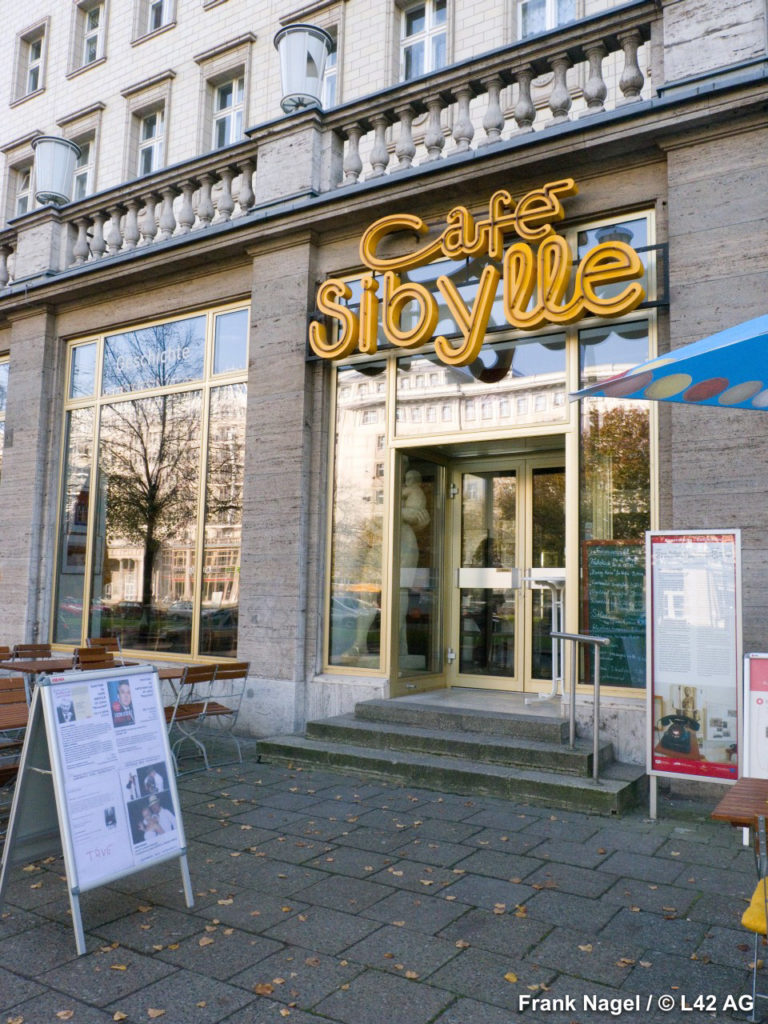
Sibylle: Full of tourists. It’s in every guide. It’s a special place because of its exhibition on the construction of Stalin Allee, though. As far as the food is concerned, well, we are in East Berlin. The guides all say that there is cake to be found. And, yes, that’s true, there are some cakes. But the average tourist for some reason thinks they are in Vienna or Salzburg, which, to be fair, are somewhat east too, that’s true, but a different one. And so they naturally ask, “Sorry, but do you have any Sachertorte, or Apple Strudel, or Black Forest cake perchance?” There are even some freaks who ask for soy milk or a kind of vegan cake. What exactly do you put in a vegan cake? And then they say that we’re the ones from another planet!
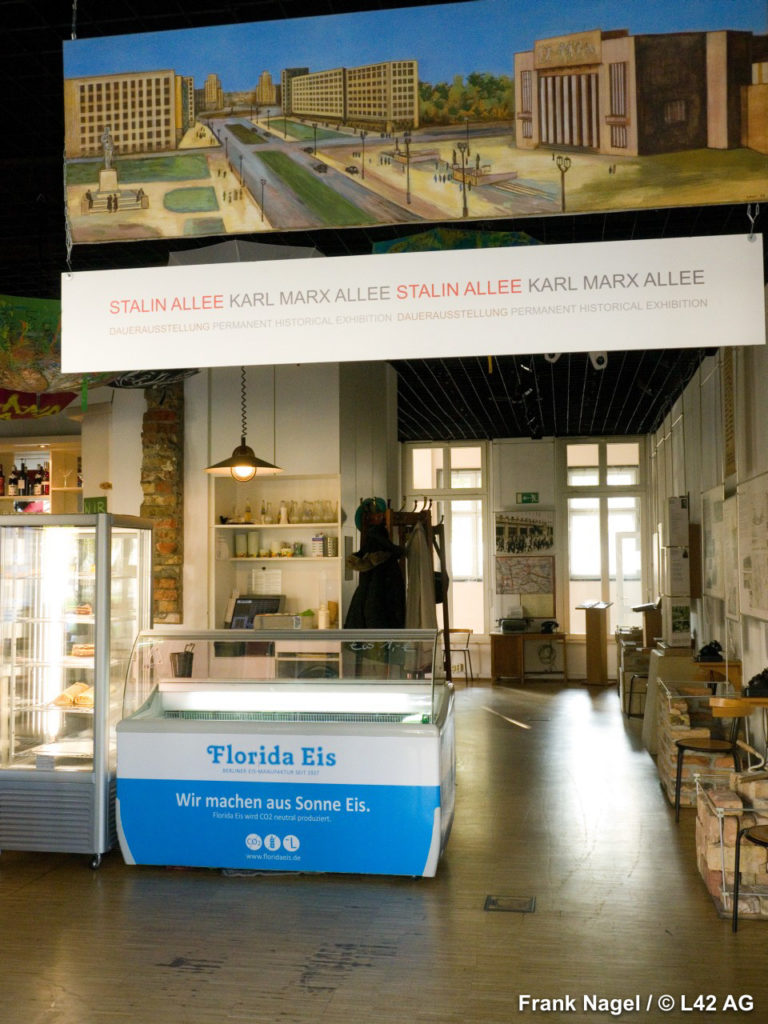
Ludmylle: And the wait staff in disarray “No, we don’t have that, no, we don’t have that, no, we don’t have that…” And every day they are worn down in exactly the same way.
Sibylle: Soy milk. Drugs and decadence! For shame! Drugging poor cows with soy! And only to give the milk the decadent taste of soy. Drug addicts! Perverts! We love our cows!

Ludmylle: Well, they don’t really drug their cows for soy milk, you know. But I get your point. In any event, now that they have gotten refreshments and gone to the bathroom, they can leave and in just a few steps arrive where the Deutsche Sporthalle was on the other side of the street, the north side, while on our side there was the statue of Stalin. Now there are new buildings both north and south. A minute of silence, please. And let us talk about the Sporthalle.
Sibylle: Really? You’re still obsessed with your gymnasium?
Ludmylle: When a myth disappears prematurely, its very absence becomes extremely present.
Sibylle: Like our very own James Dean.
Ludmylle: A short life, but an intense one. Ach! How beautiful it was! Statues, elegant Ionic columns topped by a great frieze with reliefs of athletic movements! The dream of ancient Greece! If only it hadn’t been for that damned rush to have it constructed!
Sibylle: And now we’ll have them slip quickly towards the last bit of street up to Strausberger Platz, still singing the refrain. [sings]
Pioniere, voran laßt uns vorwärst gehn!
Pioniere, stimmt an, laßt die Fahnen wehn!
Uns’re Straße, sie führt in das Morgenlicht hinein;
Wir sind stolz Pioniere zu sein!
Ludmylle: Strausberger Platz! That’s the goal!
Sibylle: No! We have to make sure they don’t take the U5! We have to push them on beyond the square. We have to tell them that the essence of our republic is right there, from Strausberger Platz to Alexanderplatz!
Ludmylle: The essence of what? There is only the immense space of a street that is too wide to be a street, too insignificant to be a square, frightening barrack-like buildings, either blistering cold or extreme heat and no refuge anywhere.
Sibylle: Exactly.
Ludmylle: Yes, but they won’t understand.
Sibylle: They will, they will.
Ludmylle: They won’t. They’ll just want to file into the U-Bahn at Schillingstraße as quickly as possible.
Sibylle: Cowards! We’ll have to stop them! We’ll have to tell them that they can’t give up now! That they have to do it for our Republic!
Ludmylle: Yes and do you know how they’ll respond?
Sibylle: Who cares? We’ll tell them they they’ve missed the opportunity to understand what it means to march and to obey. And just a few steps from the goal! What a shame! But we’ll also tell them not to worry, like Ulbricht did, that no one intends to cement shut the Schillingstraße U-Bahn station, right?
Ludmylle: Precisely! No one intends to cement shut the Schillingstraße U-Bahn station. But did they really have to ask us for this tour of the Karl-Marx-Allee?
Sibylle: It’s an honor, Ludmylle, and a perfect occasion for us to meet them halfway so to speak, and to finally take a walk together.
Ludmylle: But do you know where they are going? Everyone says that they are training, but have you understood for what exactly?
Sibylle: Training?
Ludmylle: Yep, that’s what they call it. They say they are virtuous examples of rather princely principles…
Sibylle: Princely principles?
Ludmylle: Yes. That’s the reason they’re rebuilding the castle! To tell us this story. We destroyed the castle, that symbol of Prussian absolutism and in its place had the Palast der Republik constructed. Now they’ve taken down the Palast der Republik with the excuse that it was ugly and in its place they’re reconstructing the castle. Helter-skelter! A children’s game.
Sibylle: Yes, well, this game is costing us 500 million euros, give or take a few dozen million!
Ludmylle: Dreams don’t have a price tag! That way they can finally believe that the Kingdom of Brandenburg has always been! That the Weimar Republic, Nazism, and Socialism were just temporary nightmares and that, in the end, we will all have come together under a special kind of monarchy.
Sibylle: A special kind of monarchy?
Ludmylle: Absolutely, the “Virgin Monarchy”, it’ll be a new political model, true to the old German philosophical spirit of purity. You want them to build a castle for no particular reason? Like little kids building one in the sand? To simply sing “Oh, what a fine castle marcon-diron-dirondero, oh what a fine castle, marcon-diron-dironda”? Just like we built the Stalin Allee, just for laughs. In our castle shall live the future “virgin queen” of the VKG, that is, the Virgin Kingdom of Germany.
Sibylle: You’re pulling my leg.
Ludmylle: Well, whoever’s still around will see.
Sibylle: I’m not hungry anymore. I won’t ask for the models then. We’ll just have them march tomorrow as planned.
Ludmylle: Yes, but do call for the lentil soup and the beers, please.
18:24 telephone call to Café Sibylle [omitted]
19:07 delivery of dinner [omitted]
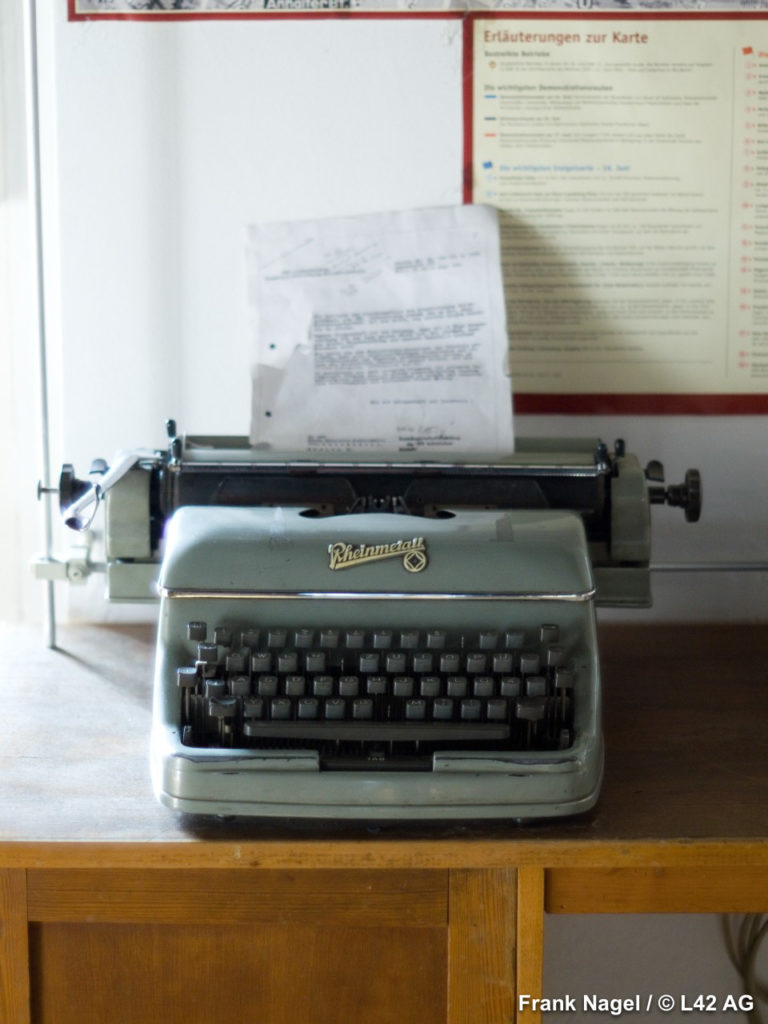
See File Nr. 17,851 Café Sibylle. Security archives.
Recording rebegun 21:18
Sibylle: Ludmylle?
Ludmylle: Sibylle, it’s been a tough day, go to sleep! Tomorrow the Wessis are coming to interview us for the guidebook.
Sibylle: You’re right, just one last thing.
Ludmylle: Hurry up!
Sibylle: But if the “Virgin Monarchy” really does come about, what will become of us?
Ludmylle: We’ll be like “The Two Towers” in The Lord of the Rings.
Sibylle: Meaning?
Ludmylle: Meaning who knows? Go to sleep!
Sibylle: Is it possible that they’ll destroy us too?
Ludmylle: Nothing is created, nothing is destroyed, everything just changes form. Go to sleep!
Sibylle: One very last thing. In your opinion, how do you think they’ll transform us?
Ludmylle: I’ll be transformed into a princess and you’ll be turned into a frog – now go to sleep!
Sibylle: And why is that?
Ludmylle: I’m sleeping. I’m not answering anymore.
Sibylle: Come on, I promise I won’t talk anymore.
Ludmylle: Because you’re a socialist, and I’m a counter-revolutionary. Good night.
Sibylle: Good night. Ludmylle? You’re not a counter-revolutionary.
Ludmylle: Tomorrow is another day. Go to sleep!
Sibylle: [sings]
Wirst du Deutschlands neues Leben,
Und die Sonne schön wie nie
über Deutschland scheint !
[tr. You are Germany’s reviving, / And over our Germany, / There is radiant sun]
Ludmylle: [sings]
Sibylle: Good night.
Ludmylle: Good night.
End of recording: 21:34
Frankfurter Tor, Berlin, January 28, 2013, 07:49
Recording nr. 8753
Sibylle: Guten Tag, Ludmylle! Today’s the day!
Ludmylle: Guten Tag, Sibylle! Oh no!
Sibylle: You know what was great about yesterday?
Ludmylle: That the past is always better than the present because we were younger?
Sibylle: Stop it! The group’s arriving! No, what was beautiful about yesterday is that we were able to talk freely among ourselves, without anyone listening, without anyone judging what we had to say. Back in our day that would have been impossible. We would have found all of the most ridiculous and personal conversations reported meticulously as if they had been an important piece of theatre. They were always listening and recording every breath. Can you imagine coming across all of your nonsense from yesterday? From Humana to the banana department at KaDeWe, from the founding myths of the GDR to “Old Pointed Beard,” Pippi Longstocking, the Bavarians, Unicum, the Virgin Monarchy…
Just imagine what West Berlin would think if they learned we had called their visitors “Disney tourists,” drug addicts, and perverts!
Ludmylle: Yes, on top of saving us as a world heritage site! They would slowly poison us to death and then say “Oh, how strange, the domes of the Frankfurter Tor have disappeared! They probably went with Sputnik for a moment to visit Mars, the last ambassadors of the GDR in space. We cannot wait for them to return so that we can celebrate them properly as true pieces of world heritage.” I can already hear them.
Sibylle: Yesterday we passed through history a bit, but freely. Today we have to act a bit for this guidebook on our avenue. How stressful! They’ve already written at least three hundred! Let’s just say a few things, please, then they’ll leave quickly and we won’t have any problems. And let me take care of it, okay? And don’t you dare sing for any reason!
Ludmylle: [sings]
Denn es muss uns doch gelingen
Dass die Sonne schön wie nie
Über Deutschland scheint
Über Deutschland scheint
End of recording 07:56
Translated by Alexander Booth
